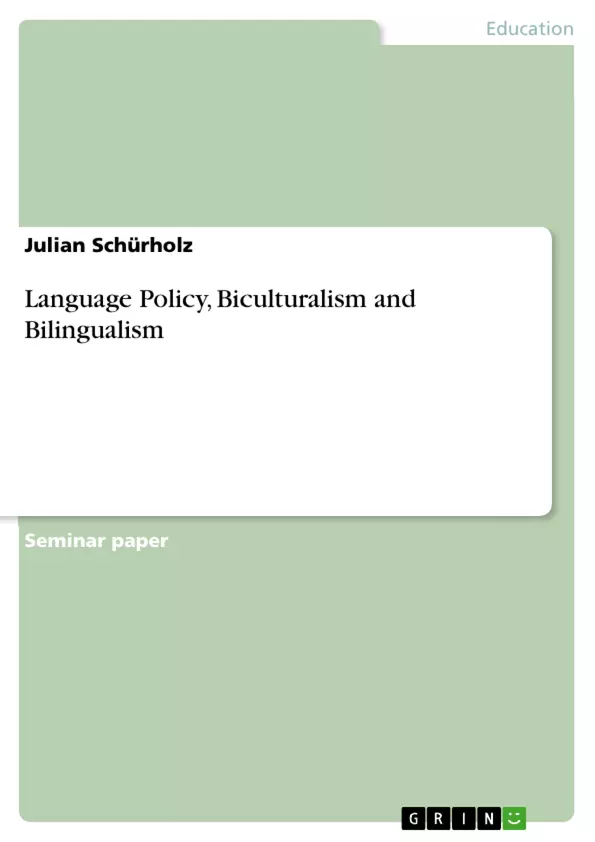This paper will examine the chances and limitations of successful language policy, exemplified by a close look at the language situation in Canada, to answer the question of to what extend language policy can be a helpful means to support biculturalism and bilingualism in a heterogeneous society.
In order to do so, this paper will present an outline of the history of as well as the social situation in Canada, and give definitions of crucial terms.
Then it will dwell on federal and provincial language policies as well as on education issues. The afterwards worked out possible parallels between both will eventually lead to a conclusion about the chances of successful realization of an advanced multicultural society through language policy.
As Canadian language policy is designed to almost exclusively effect the status of English and French, this paper will focus on the language conflict between these two languages and only shortly touch the topic of non-official and native languages.
Inhaltsverzeichnis (Table of Contents)
- Introduction
- Basic Facts about Canada
- Why language policy is necessary
- Definitions of crucial terms
- Language policy
- History of federal language policy in Canada
- History of provincial language policy in Canada
- Education and bilingualism
- Societal outcomes of Canadian language policy
Zielsetzung und Themenschwerpunkte (Objectives and Key Themes)
This paper aims to analyze the effectiveness and limitations of language policy through a case study of Canada. By examining the language situation in Canada, the paper investigates the extent to which language policy can contribute to the promotion of biculturalism and bilingualism within a diverse society. The study will explore the historical context of Canadian language policy, the societal implications of this policy, and the role of education in fostering bilingualism. The paper will also delve into the potential consequences of language policy on minority language groups.
- The effectiveness of language policy in promoting bilingualism and biculturalism
- The historical development of language policy in Canada
- The societal outcomes of language policy in Canada
- The challenges of maintaining language diversity within a multicultural society
- The relationship between language policy, identity, and social mobility
Zusammenfassung der Kapitel (Chapter Summaries)
- Introduction: This chapter introduces the research question and outlines the paper's objectives. It highlights the focus on the Canadian language situation as a case study for analyzing the effectiveness of language policy in promoting bilingualism and biculturalism in a diverse society. The chapter also emphasizes the importance of examining the historical context and societal implications of language policy in Canada.
- Basic Facts about Canada: This chapter provides an overview of Canada's geography, demographics, and political structure. It emphasizes the importance of understanding the country's historical context and the role of both federal and provincial governments in shaping language policy. The chapter also highlights the significance of Canada's cultural diversity and the ongoing debate surrounding language policy in the context of a multicultural society.
- Why language policy is necessary: This chapter delves into the reasons behind the importance of promoting bilingualism and the implementation of language policy. It explores the historical context of language use in Canada, highlighting the role of English and French as dominant languages and the impact on other language groups. The chapter also examines the link between language and identity, emphasizing the potential for language policy to influence social mobility and cultural preservation.
Schlüsselwörter (Keywords)
Key concepts and terms explored in this paper include: language policy, bilingualism, biculturalism, multiculturalism, Canadian identity, linguistic diversity, official languages, language conflict, social mobility, cultural preservation, and the historical development of language policy in Canada.
Frequently Asked Questions
How does language policy support bilingualism in Canada?
Language policy, such as the Official Languages Act, establishes English and French as equal, providing a framework for education and government services in both languages.
What is the historical context of Canadian language policy?
It stems from the historical conflict and coexistence of British and French settlers, leading to federal and provincial laws to protect linguistic rights.
Why is language policy necessary in a heterogeneous society?
It helps maintain social cohesion, protects minority rights, and ensures that different cultural groups have equal access to social mobility and identity preservation.
What is the relationship between language and social mobility?
Proficiency in official languages is often a prerequisite for economic success and political participation, making language policy a tool for social equity.
Does Canadian language policy affect native languages?
While primarily focused on English and French, modern policy discussions increasingly touch upon the preservation of non-official and indigenous languages.
- Citar trabajo
- Julian Schürholz (Autor), 2008, Language Policy, Biculturalism and Bilingualism, Múnich, GRIN Verlag, https://www.grin.com/document/154659



